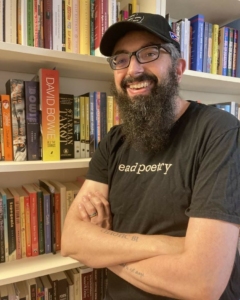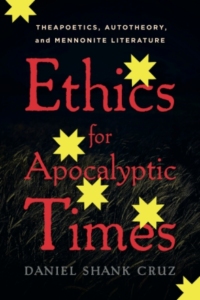Welcome to 7 Questions, our series where we highlight exciting scholars in the field of religion and get to know the person behind the book. For this article, we interviewed Daniel Shank Cruz, whose book Ethics for Apocalyptic Times: Theapoetics, Autotheory, and Mennonite Literature was recently published with Penn State University Press.
Get to Know Daniel

Daniel Shank Cruz (they/multitudes) is a queer disabled boricua who grew up in the Bronx and Lancaster, Pennsylvania. They have an MFA in Creative Nonfiction from Hunter College of the City University of New York and a PhD in English from Northern Illinois University. Multitudes is the author of a book of literary criticism, Queering Mennonite Literature: Archives, Activism, and the Search for Community (Penn State University Press, 2019), and a hybrid memoir/literary critical text, Ethics for Apocalyptic Times: Theapoetics, Autotheory, and Mennonite Literature (Penn State University Press, 2023). Their writing has also appeared in venues such as Modern Haiku, Religion & Literature, Your Impossible Voice, and numerous essay collections. Visit them at danielshankcruz.com.
Daniel Answers Our 7 Questions
Question 1: What sparked the idea to write this book?
I began working on the book as a book in the spring of 2020. At the time, I was working on another manuscript, a memoir, and was not looking for a second book project. However, two events occurred in short order that led me to Ethics for Apocalyptic Times. The first was that in December 2019 I was asked to contribute essays to two theological projects, which was exciting but also a bit puzzling because at the time I thought of myself as a literary critic rather than a theologian. The second was the beginning of the COVID-19 pandemic in March 2020 and my reading of Emily St. John Mandel’s pandemic novel Station Eleven during the first week of lockdown. As I was freaking out in those early days, and then beginning to reevaluate my entire life in the following months, Station Eleven helped to clarify my thinking about what literature (and art in general) does. Simultaneously, I realized that the theological essays I was working on were also about this subject. This realization helped me to see that I had been reading literature as a kind of ethics since I began studying it seriously in my last three semesters of college (indeed, part of chapter two is actually a revised version of an essay I wrote during my senior year of college). Now, twenty years later, I had the queer intersectional theoretical tools and enough seasoning as a writer to theorize this reading for others.
Question 2: What role does the sacred play in relation to your work broadly? Where do you see the sacred or sacred things in this book specifically?
Until this book, I would not have said that the sacred played any role in my writing because I generally view myself as a secular person and did not have any sort of spiritual practice for close to two decades. However, as I say in the book, I felt led to restart a spiritual practice in 2019, albeit one that is quite different from when I was a Christian. I’m sure this practice helped to create the openness necessary for me to accept the vision for the book once it arrived about a year later. Writing it definitely felt like I was responding to a call from something bigger than me. Similarly, as I discuss in chapter two, a lot of the scholarship I wrote in the decade between finishing my PhD and beginning Ethics for Apocalyptic Times was in response to invitations from others in the Mennonite literary community, so I suppose one could say there was also a kind of call operating there.
The sacred, or what I call “the Divine,” which can be a secular or spiritual force, is everywhere throughout Ethics for Apocalyptic Times. It is the entity that allows us to experience beauty in literature or elsewhere, and it is these experiences that help us to act ethically.
Question 3: If you were to describe the book to someone who is unfamiliar with religious and academic jargon, how would you summarize it?
Ethics for Apocalyptic Times shows how reading literature in light of, and in dialogue with, personal experience (this is the “autotheory” of the subtitle) helps readers to open themselves up to encounters with the Divine. During times of stress, many of us turn to art for solace. The book walks readers through one version of this process, showing how connecting to what we read through our personal experiences can help us find this comfort. By doing so, we can learn how to act ethically in a world where it seems many have forgotten how. These literary encounters are what I call theapoetic ones. They can help us navigate what Leah Lakshmi Piepzna-Samarasinha calls the “triple pandemic” of COVID-19, climate change, and the shift toward fascism in global politics.
The book avoids academic jargon as much as possible and tries to explain the theory it uses in plain language because queer theory, for instance, is pointless if the average queer person on the street can’t understand it. Despite the use of two theoretical terms (theapoetics and autotheory) in the subtitle–partly for marketing reasons, partly because they are the already-established descriptors of the concepts I’m writing about–I hope and believe that my definitions and usages of those terms are accessible to non-academics.
Question 4: Who were models or inspirations for you as you wrote this book?
Many of the authors whose fiction and poetry I write about, such as Sofia Samatar, Samuel R. Delany, Julia Spicher Kasdorf, and Jeff Gundy, have long been inspirations for my writing life. Books that were helpful for Ethics for Apocalyptic Times’s form and thinking include Sara Ahmed’s Living a Feminist Life, Ann Cvetkovich’s An Archive of Feelings, Lauren Fournier’s Autotheory as Feminist Practice, Jane Gallop’s Sexuality, Disability, and Aging, Natalie Loveless’s How to Make Art at the End of the World, Leah Lakshmi Piepzna-Samarasinha’s Care Work, Walt Whitman’s Leaves of Grass, and Kate Zambreno’s Heroines. Some of these made it into the Bibliography and some did not, but are there lurking in the book anyway.
Question 5: What was the most difficult thing about writing the book? Did you encounter any unexpected problems or challenges?
The book’s form is a fairly unusual one, so it took me a while to figure out what shape it wanted to take. It began as literary criticism and became more and more memoiristic as I wrote. But overall, as I describe further below, Ethics for Apocalyptic Times has been the smoothest writing experience of my life, for which I am grateful. It would be wonderful if I can have such an experience again in the future.

Question 6: What has surprised you the most about the book, either in its writing or reception?
The writing process for the book was very different from my process for the other long writing projects I’ve completed because once I had the idea, it just poured out onto the keyboard: the first draft took about four months to write, which is very fast for me. It felt like the book was there waiting for me, I just had to find it. So there was a lot less writing agony involved with this project than with my others. At the same time, I had no idea whether the book would make sense to others because of its hybrid form, so it was quite heartening to get two enthusiastic peer reviews back from the publisher that both encouraged me to lean even further into the weirdness. I hope that once the book is released on November 21 its readers will also find what it has to say helpful for their journeys through our terrible times.
Question 7: With this book done, what’s up next for you?
I’m shopping around manuscripts of a memoir and a novella, and writing lots of haiku and senryu. I have about thirty pages of notes for another memoir about my disabilities, but I’m not sure if that’s the right project for me at the moment. So we’ll see which of these threads ends up revealing itself as my next focus
You can order Ethics for Apocalyptic Times: Theapoetics, Autotheory, and Mennonite Literature here.
